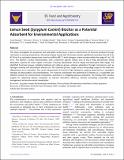| dc.contributor.author | Ripanda, Asha | |
| dc.contributor.author | Rwiza, Mwemezi | |
| dc.contributor.author | Giridhar Reddy, S. | |
| dc.contributor.author | Nyanza, Elias | |
| dc.contributor.author | Bakari, Ramadhani | |
| dc.contributor.author | Miraji, Hossein | |
| dc.contributor.author | Ravikumar, C. R. | |
| dc.contributor.author | Ananda Murthy, H. C. | |
| dc.contributor.author | Vuai, Saidi | |
| dc.contributor.author | Machunda, Revocatus | |
| dc.contributor.author | Annamareddy, Sri Hari | |
| dc.date.accessioned | 2025-05-06T10:58:25Z | |
| dc.date.available | 2025-05-06T10:58:25Z | |
| dc.date.issued | 2025-02-18 | |
| dc.identifier.uri | http://dx.doi.org/10.30919/faf1415 | |
| dc.identifier.uri | https://dspace.nm-aist.ac.tz/handle/20.500.12479/3144 | |
| dc.description | This research article was published in ES Food & Agroforestry, Volume 19, 2025 | en_US |
| dc.description.abstract | This study investigates the properties and adsorption performance of jamun seed biochar (JS biochar) produced through calcination at varying temperatures. Elemental analysis reveals that the carbon content significantly increases from 64.25 to 87.93 wt.% as calcination temperature rises from 400 to 600 °C, while nitrogen content remains within the range of 2 to 2.29 wt.%. The biochar's surface characteristics, with a maximum specific surface area of 261.2 m²/g, demonstrate strong adsorption capacity for small organic molecules, including ciprofloxacin (555.55 mg/g) and lamivudine (400 mg/g). The identified functional groups, including hydroxyl and carbonyl groups, enhance adsorption through mechanisms such as hydrogen bonding and electrostatic interactions. The observed porous, rough surface morphology supports the material's effectiveness as an adsorbent. The results demonstrate JS biochar’s high adsorption capacity, governed by a synergistic interplay of physisorption and chemisorption. This research underscores the potential of JS biochar as a sustainable and effective solution for environmental remediation, particularly in mitigating aqueous pollutants. The findings offer valuable insights for optimizing biochar properties to improve adsorption efficiency, thereby promoting sustainable waste management and environmental remediation. | en_US |
| dc.language.iso | en | en_US |
| dc.publisher | Engineered Science Publisher | en_US |
| dc.subject | Syzygium cumini | en_US |
| dc.subject | Environmental remediation | en_US |
| dc.subject | Water pollution | en_US |
| dc.subject | Biomass-based adsorbents | en_US |
| dc.subject | Surface properties | en_US |
| dc.title | Jamun Seed (Syzygium Cumini) Biochar as a Potential Adsorbent for Environmental Applications | en_US |
| dc.type | Article | en_US |

